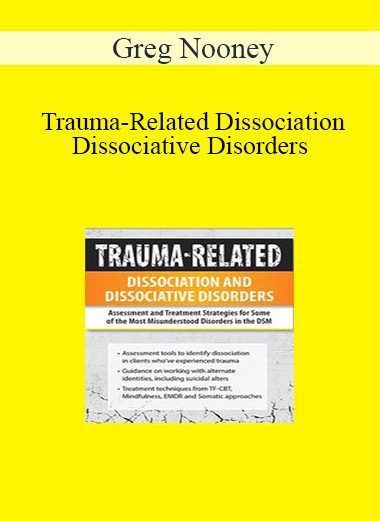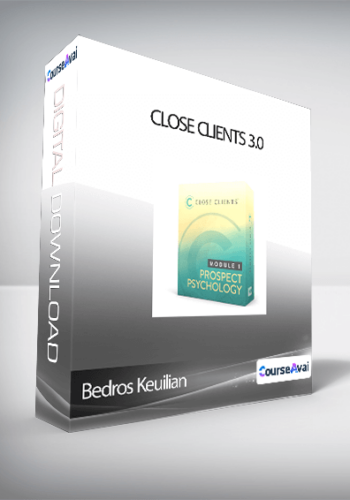Greg Nooney – Trauma-Related Dissociation and Dissociative Disorders: Assessment and Treatment Strategies for Some of the Most Misunderstood Disorders in the DSM
Original price was: $219.99.$36.90Current price is: $36.90.
[Instant Download] – Immediately deliver the download link after receiving the payment
Description
Unlock your potential with the Unlock your potential with the Greg Nooney – Trauma-Related Dissociation and Dissociative Disorders: Assessment and Treatment Strategies for Some of the Most Misunderstood Disorders in the DSMGreg Nooney – Trauma-Related Dissociation and Dissociative Disorders: Assessment and Treatment Strategies for Some of the Most Misunderstood Disorders in the DSM course for only course for only Original price was: $219.99.Original price was: $219.99.$$36.9036.90Current price is: $36.90.Current price is: $36.90. at at Giolib.comGiolib.com! Explore our comprehensive library of over 60,000 downloadable digital courses across various ! Explore our comprehensive library of over 60,000 downloadable digital courses across various Medical & HealthMedical & Health. Get expert-led, self-paced learning at up to 80% savings. Elevate your skills today!. Get expert-led, self-paced learning at up to 80% savings. Elevate your skills today!
- Faculty:Faculty:
- Greg NooneyGreg Nooney
- Duration:Duration:
- 6 Hours 5 Minutes6 Hours 5 Minutes
- Format:Format:
- Audio and VideoAudio and Video
- Copyright:Copyright:
- Sep 25, 2018Sep 25, 2018
Description
Handouts
| Manual – Trauma-Related Dissociation and Dissociative Disorders (2.64 MB) Manual – Trauma-Related Dissociation and Dissociative Disorders (2.64 MB) | 84 Pages84 Pages | Available after Purchase Available after Purchase |
Outline
Developmental Trauma, Symptomology and Risk FactorsDevelopmental Trauma, Symptomology and Risk Factors
- The role of early traumatic stress and insecure attachmentThe role of early traumatic stress and insecure attachment
- Types of Dissociative Disorders and symptomologyTypes of Dissociative Disorders and symptomology
- Dissociative Amnesia, Depersonalization Disorder,Dissociative Amnesia, Depersonalization Disorder,
- Dissociative Identity DisorderDissociative Identity Disorder
- Populations at risk for dissociative issuesPopulations at risk for dissociative issues
- The controversy – misconceptions and false memoriesThe controversy – misconceptions and false memories
Clinical Assessment Tools for Trauma and Dissociative DisordersClinical Assessment Tools for Trauma and Dissociative Disorders
- Adult Attachment InterviewAdult Attachment Interview
- Adverse Childhood Experiences QuestionnaireAdverse Childhood Experiences Questionnaire
- Dissociative Experiences ScaleDissociative Experiences Scale
- Identifying co-occurring disordersIdentifying co-occurring disorders
- Avoiding false negatives and false positives in diagnosing DIDAvoiding false negatives and false positives in diagnosing DID
Problems and Solutions in the Treatment of People with Dissociative DisordersProblems and Solutions in the Treatment of People with Dissociative Disorders
- Maximize attunement with clients who are dissociatingMaximize attunement with clients who are dissociating
- Getting client buy inGetting client buy in
- How to establish trust and cooperationHow to establish trust and cooperation
- Manage issues that can interfere in therapyManage issues that can interfere in therapy
- Compassion fatigueCompassion fatigue
- Modulating your own reactionsModulating your own reactions
- The dangers of vicarious traumaThe dangers of vicarious trauma
- Identify and address implicit biasesIdentify and address implicit biases
- Maintain therapeutic limits and boundariesMaintain therapeutic limits and boundaries
- Engagement of alternate identities in DIDEngagement of alternate identities in DID
Therapeutic Techniques that Develop Stability and Safety for Dissociating ClientsTherapeutic Techniques that Develop Stability and Safety for Dissociating Clients
- Calming practices to ground the dissociative clientCalming practices to ground the dissociative client
- Conscious breathingConscious breathing
- Relaxation techniquesRelaxation techniques
- MindfulnessMindfulness
- Working with clients facing continued abuseWorking with clients facing continued abuse
- Techniques to manage suicidal crises – account for the suicidal alterTechniques to manage suicidal crises – account for the suicidal alter
- Don’t let “crises of the week” keep you from reaching treatment goalsDon’t let “crises of the week” keep you from reaching treatment goals
- Build support systems with WRAP plans (Wellness Recovery Action Plan)Build support systems with WRAP plans (Wellness Recovery Action Plan)
Specific Trauma Work for Dissociative Disorder Treatment PlansSpecific Trauma Work for Dissociative Disorder Treatment Plans
- Differences in working with DID clientsDifferences in working with DID clients
- The role of resourcing in traumaThe role of resourcing in trauma
- Calm clients and create personal safety with TF-CBTCalm clients and create personal safety with TF-CBT
- Eye Movement Desensitization and Reprocessing (EMDR)Eye Movement Desensitization and Reprocessing (EMDR)
- Somatic approaches – connect memory to the bodySomatic approaches – connect memory to the body
Limitations of the Research and Potential Treatment RisksLimitations of the Research and Potential Treatment Risks
- Feasibility of randomized prospective double-blind placebo-controlled studiesFeasibility of randomized prospective double-blind placebo-controlled studies
- Ethical, financial, and logistical constraintsEthical, financial, and logistical constraints
- Trauma, disorganized attachment and research dataTrauma, disorganized attachment and research data
- Potential risks in treating trauma and Dissociative disordersPotential risks in treating trauma and Dissociative disorders
Faculty
Greg Nooney, LISW Related seminars and products: 1
Narrative Space LLC
Greg Nooney, LISW Greg Nooney, LISW has worked with seriously mentally ill individuals for over three decades and has received specialized training in treating severely dissociated clients. He has worked with clients with dissociative disorders throughout his career and has a special passion of helping other clinicians learn effective ways to treat these individuals. Greg has taught workshops and conferences on ethics, narrative therapy practices, treating severe trauma, and burnout.has worked with seriously mentally ill individuals for over three decades and has received specialized training in treating severely dissociated clients. He has worked with clients with dissociative disorders throughout his career and has a special passion of helping other clinicians learn effective ways to treat these individuals. Greg has taught workshops and conferences on ethics, narrative therapy practices, treating severe trauma, and burnout.
He has worked in mental health centers, in private practice and most recently at Burgess Hospital in Onawa where he was the director of the mental health section for ten years. He is an adjunct instructor at the University of Iowa School of Social Work and regularly teaches a class on the DSM to graduate students. Greg has also been a field instructor for Masters of Social Work students at the University of Iowa, University of Nebraska, and the University of North Carolina.He has worked in mental health centers, in private practice and most recently at Burgess Hospital in Onawa where he was the director of the mental health section for ten years. He is an adjunct instructor at the University of Iowa School of Social Work and regularly teaches a class on the DSM to graduate students. Greg has also been a field instructor for Masters of Social Work students at the University of Iowa, University of Nebraska, and the University of North Carolina.
He began working in the mental health field in 1971, working in rehab centers and psychiatric hospitals. Greg earned his Masters in Social Work from Loyola University in Chicago in 1983.He began working in the mental health field in 1971, working in rehab centers and psychiatric hospitals. Greg earned his Masters in Social Work from Loyola University in Chicago in 1983.
Speaker Disclosures:Speaker Disclosures:
Financial: Gregory Nooney is the director for Burgess Mental Health. He receives a speaking honorarium from PESI, Inc.Financial: Gregory Nooney is the director for Burgess Mental Health. He receives a speaking honorarium from PESI, Inc.
Non-financial: Gregory Nooney is a member of the National Association of Social Workers.Non-financial: Gregory Nooney is a member of the National Association of Social Workers.
Future-proof your knowledge with the Future-proof your knowledge with the Greg Nooney – Trauma-Related Dissociation and Dissociative Disorders: Assessment and Treatment Strategies for Some of the Most Misunderstood Disorders in the DSMGreg Nooney – Trauma-Related Dissociation and Dissociative Disorders: Assessment and Treatment Strategies for Some of the Most Misunderstood Disorders in the DSM course at course at GiOlibGiOlib! Enjoy lifetime access to high-quality digital content, crafted to advance your career and personal development.! Enjoy lifetime access to high-quality digital content, crafted to advance your career and personal development.
- Lifetime Access:Lifetime Access: Permanent access to all purchased courses. Permanent access to all purchased courses.
- Smart Savings:Smart Savings: Benefit from prices up to 80% off original course costs. Benefit from prices up to 80% off original course costs.
- Safe Transactions:Safe Transactions: Process your payments securely. Process your payments securely.
- Practical Insights:Practical Insights: Gain actionable skills relevant to today's demands. Gain actionable skills relevant to today's demands.
- Instant Availability:Instant Availability: Begin your course immediately after payment. Begin your course immediately after payment.
- Flexible Learning:Flexible Learning: Access content effortlessly on any device. Access content effortlessly on any device.
Start expanding your horizons with Start expanding your horizons with GiOlibGiOlib!!





